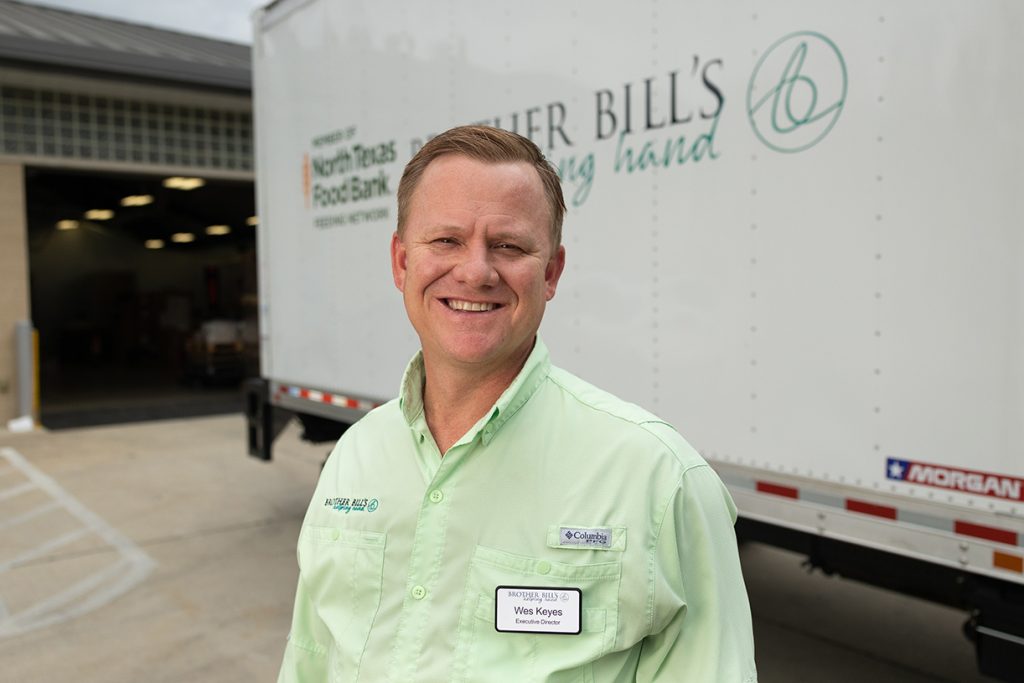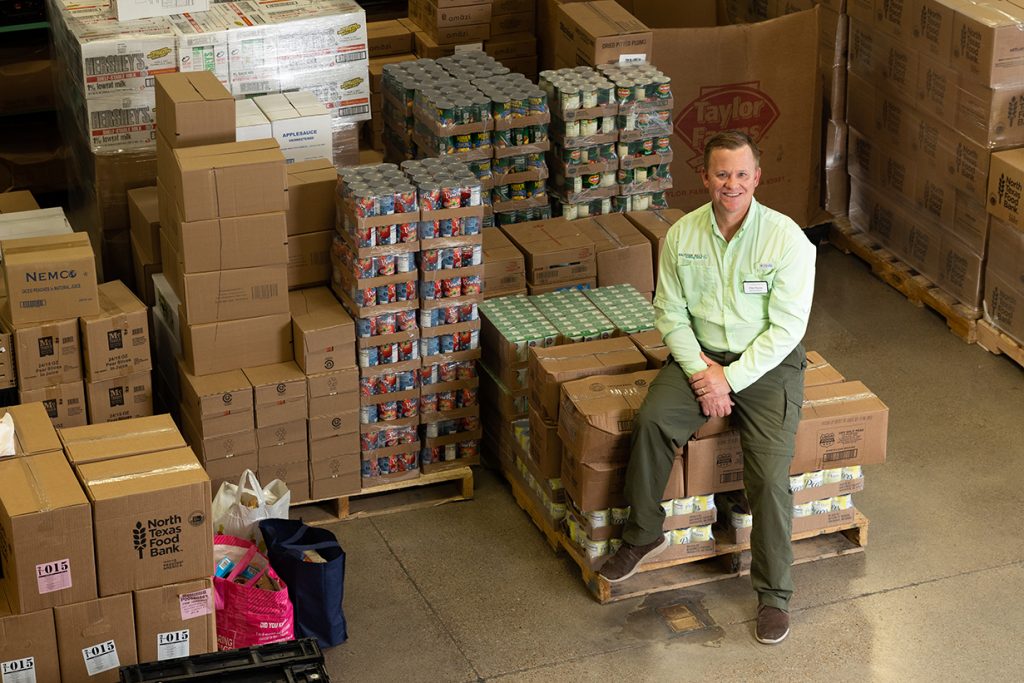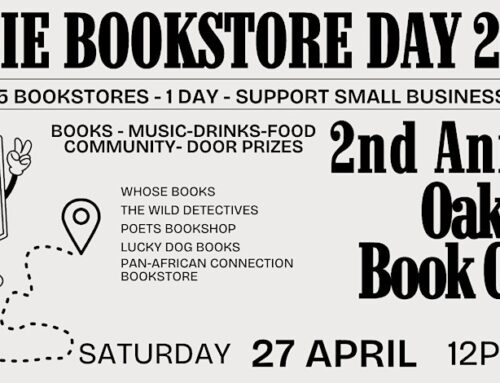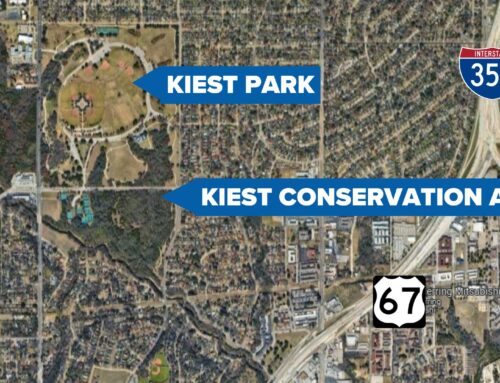
Wes Keyes is the executive director of West Dallas-based nonprofit Brother Bill’s Helping Hand. Photography by Gabriel Cano.
If you never heard of Brother Bill’s Helping Hand until last year, it’s a wonder.
“We’re only 77 years old,” says Wes Keyes, a Winnetka Heights resident who is its executive director.
The West Dallas-based nonprofit was formed in the 1940s to fight poverty in that neighborhood. Until a couple of years ago, Brother Bill’s served one ZIP code, 75212. But gentrification has pushed so many people out of the neighborhood that there’s been a decline in demand.
While West Dallas and surrounding areas are still Brother Bill’s focus, they expanded to 65 ZIP codes a couple of years ago, and last year, they served people in 91 ZIP codes in the Dallas area.
Keyes is from Laurel, Mississippi, and moved to Texas to pursue a master’s degree at Baylor University, where he met his wife, Beth, who is now a physician and serves as president of the PTO at the Kessler School. They have two children, 11-year-old Sarah Beth and 7-year-old Liam.
How did you get involved in working against poverty?
I worked as a youth minister while my wife was in med school. I worked with African American and Latinx communities in Waco, and I learned a lot about how to work in communities and listen to community voices. It was a revolutionary time in my life. I lived in the area that we were serving, and I never knew homeless people before. So the big city of Waco opened my eyes to that.
How did you wind up in Dallas?
My wife got her first job at Barrios Unidos Community Clinic, and we started going to Cliff Temple Baptist Church. I was the missions pastor at Cliff Temple for seven or eight years. I got emerged more into Dallas and started understanding the culture of poverty in Dallas. I started working at a nonprofit called Advocates for Community Transformation, and I learned a lot about West Dallas.
Like what?
I learned a lot about crime and culture and poverty and how they’re mixed. I met people fighting for rights in their own neighborhoods, dealing with a drug house next door or with food insecurity. I saw so much injustice in that part of Dallas for years and years and years, and I really got to love that part of the world. I had no intention of leaving. But Brother Bill’s had a hiring committee looking for a new executive director, and they asked me to apply. That was almost four years ago.
Tell us about what services Brother Bill’s provides.
We’re a wrap-around service nonprofit, and there are a couple of points of entry. We started everything with our grocery store. We don’t call it a pantry. Normally, our neighbors get their shopping carts and pick what they want. Since the pandemic, we can’t do that. It’s a drive-thru now.
And you provide medical care?
We have a full clinic on site. Our physician’s assistant is from West Dallas originally, and we pay for him, but he’s loaned to us through Methodist Health System, and we have a great partnership with Methodist on that. It’s a full primary clinic, so it’s not an emergent clinic. We’re their doctor’s office.
What else?
The next tier is empowerment, and that includes learning. Learning could be Zumba, ESL, financial literacy, soccer camps, ballet camps, STEM camps. We have Children’s Hospital come up once a month and take the food our neighbors are getting from the grocery store and teach them how to cook it. Those classes are always packed. We also have a job-training program called Pathways. That’s six to eight women at a time who go through a real intensive program. They learn about their finances, their faith, their friends, and everything they need to know to be successful in life in order to find a job and hold a job. Two of our employees went through that program.
What’s the next thing?
Tier three is neighbors who once needed to get food from us, now they’re employees or volunteers, or they’re donors. When people don’t need our services anymore. A neighbor told me her husband works for DART now and has good insurance, so they no longer need to use our clinic. We want to move people away from us so they’re not dependent on us anymore.
Explain your focus on dignity.
When someone comes to us for groceries, we don’t want them to look at us as their savior. We want them to look at us as an equal, and we’re just there to facilitate a grocery store so they can get everything they need. If they’re a patient of our clinic, we ask them to chip in some money for their health care so they have a value add. It’s a suggested donation I think of $10. But we create these opportunities for honor and dignity. We call the people that we serve “neighbors.” That might seem like a small thing. For us it’s a biblical metaphor, but it’s also a Mr. Rogers metaphor. We love our neighbors, and we try our best to support them. Most of my employees started out getting food from Brother Bill’s. So they already know what it’s like to be in that situation.
What are some other ways you do that?
Christmas was a big event, but it was always held on Christmas Eve. Families could come, and volunteers would come and give out presents from Brother Bill’s. We realized first of all that’s not a great time to do a program because people want to go to church with their families on Christmas Eve. So we thought if we did it the week before Christmas, kids are out of school, so we have a program for the kids. They can go in the back and make gingerbread houses. And then mom and dad can go shop for unopened presents, just like we do for our grocery store. Then they either wrap them in a wrapping station, or they hide them in the trunk of their car. And when they get home, they gave the presents, not Brother Bill’s. It’s a nuanced change, but it’s important because it empowers dignity.
What other ways is Brother Bill’s a little different?
We listen to our neighbors. We have a community council in which we empower our neighbors to think about stuff. Neighbors wanted a DART bus stop so they could get here more easily, so they advocated for that, and now we have a DART stop right outside.
What else do you want our readers to know about you?
Brother Bill’s is like a seven-minute drive from Oak Cliff. Our neighborhood is experiencing rampant gentrification and property valuation increases. Taxes are going up so much that our people are leaving. We’ve lost so many neighbors because of that. I just want people to know that these are your neighbors. During the pandemic, these areas have been greatly affected in ways that some other communities have not. My employees have lost 10 family members during the pandemic. One of my employees lost five family members, and two of those were her brother-in-law and sister-in-law who were in their 30s and 40s. What’s more is the mental-health aspect. We have mental-health counseling five days a week, and we have three counselors on site. Our counseling numbers doubled during the pandemic through telehealth medicine. We’re still not out of the woods yet.
Tell us about all the work you did early in the pandemic.
We haven’t closed one single day except for the winter storm. When everything got shut down, we moved to a drive-thru model immediately. We served diapers and formula for new and expecting moms that very Friday. And then the next day we gave a lot of food out. So we’ve been doing it and doing it and doing it more than we ever have. One big statistic that shows the need during the pandemic is that in 2019 we served 750,000 pounds of food. Last year we served 1.3 million pounds of food.
What have y’all learned since the pandemic?
Nonprofits underestimate their clients’ ability to use technology. We got (an SMS aggregator) to text neighbors. The silver lining is that we’ve used technology to communicate with our neighbors on a new level. We text them, and they can sign up on their own. I would encourage any nonprofit out there to look at your population the same way you look at yourself. Of course, there are differences, but everybody has a cellphone, and it was an opportunity for us to reach out and let them know we aren’t going anywhere. We’re still here. And it has paid dividends for us in terms of being able to serve our neighbors.
Tell us about your technology grant from the Carruth Foundation.
Now we’re working on new technology with Sharing Life Community Outreach in Mesquite. We’ll be one of the first nonprofits to have an e-pantry. So it’s like an Instacart, where they can shop at Brother Bill’s on their phone. We’re developing the app with a former Erickson employee. The Northern Illinois Food Bank gave us permission to use their model, but ours will be different from theirs.
Do you see a lot of involvement from Oak Cliffers at Brother Bill’s?
Yes. Andrew Snow’s company, Track 15, is our development wing. They help with grant writing. We wrote over $1 million in grants in 2019. We also have several board members who live in Oak Cliff: Bret Schuch, Dr. Keith Bloom and Lori Dipprey. I have to thank the Oak Cliff community, especially my neighbors in Winnetka Heights and Kessler Park. We’ve gotten Oak Cliff engaged in ways they never have been before.
What is Brother Bill’s brotherhood?
There are a lot of people in community who are hunters or have access to lean organic game. Many of our neighbors are diabetic, and we are able to help their diets with portions of the harvest that these hunters bring to us. It’s a really cool opportunity to engage more men as volunteers here.






